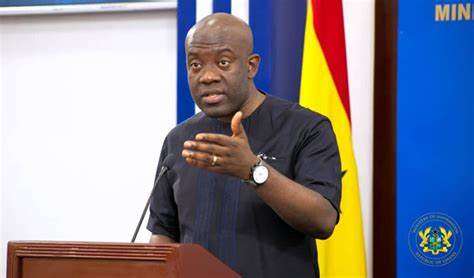Disasters, endemics, and pandemics have proven to be good avenues for corruption.
As governmental agencies begin to put out budgetary allocations in support of the victims, matters of prudence must be given the necessary attention.
Volta River Authority alone has announced GHS 20 million while the government is reported to set aside some USD 40 million of some World Bank Funds for the victims. Reports indicate that other ministry and agencies will soon announce their budgetary allocations to salvage the plights of the victims.
In the aftermath of COVID-19, most Ghanaians were shocked at the government’s expenditure on the pandemic.
The Information Minister, Kojo Oppong Nkrumah, who is also the MP for Ofoase Ayirebi indicated that the total expenditure since COVID-19 struck in Ghana amounted to GHS19 billion.

It was, however, alleged that the government’s mismanagement and corruption among officials during the pandemic led to economic hardships soon after the pandemic which led to the government’s introduction of new taxes. This allegation which was denied by the government remained widely accepted among the population.
“The government has never said that we have to pay for the free water and free electricity of 2020. The COVID-19 levy is not for free water and electricity.
“It never says anywhere that we have to pay for the free water and electricity of 2020. It outlines what the government has done so far in connection with the COVID-19 program, and then it goes on to make the point that to provide the requisite resources to sustain the implementation of these measures, the government is proposing the introduction of a COVID-19 health levy of 1% increase in the National Health insurance levy and 1% point increase in the VAT flat rate and for that purpose. We urge you to highlight the correct position as it has been put out by the Ministry of Finance.”
Kojo Oppong Nkrumah
Meanwhile, the NDC Member of Parliament for Yapei Kusawgu, John Jinapor, accused the government of only utilizing GHS1.7 billion of the allocated GHS19 billion for issues of COVID-19 in 2020. Hon. John Jinapor was not the only Ghanaian who perceived some dubious move in the government’s expenditure during the pandemic.
Many Ghanaians while expressing their shock alleged that government officials took advantage of the pandemic to ‘loot and share’.
As communities grapple with the shattering impact of a catastrophe, a shadowy narrative often emerges, one rife with tales of unscrupulous public officers exploiting the chaos and desperation to plunder the very resources intended for relief and recovery. Amidst the ruins of broken homes and shattered livelihoods, a disturbing pattern unravels, revealing the sinister machinations of those entrusted with the nation’s well-being.
Their honeyed words and hollow pledges of support serve as bait, enticing the desperate and dispossessed to place their hopes in these supposed saviors. Behind closed doors, deals are clandestinely brokered, and funds earmarked for reconstruction may swiftly be diverted into the labyrinthine pockets of these unscrupulous actors.
One of such deals, unfolding in the public glare, is the testing of COVID at the Kotoka International Airport.
The funds intended for the reconstruction of shattered communities may be channeled into offshore accounts, swanky properties, and luxurious lifestyles, while the victims of the disaster are left to grapple with the harsh realities of their plight, stranded in a desolate landscape of broken promises and shattered dreams.
It is in this unwavering demand for justice and accountability, the persistent clamor for transparency and ethical governance, that the call is made.
Guarding The Public Purse In Disasters
Guarding the nation’s purse from corruption during a disaster is crucial for ensuring effective and transparent use of resources to aid recovery and relief efforts.

It requires that transparent allocation and disbursement policies are implemented. Oversight and accountability should be maintained by independent oversight bodies and mechanisms to monitor the use of funds and resources during the disaster response, now and after.
This is no time to cease clear procurement procedures. The laws on procurement must be strictly adhered to. It makes room for what should be done in emergencies like these. Emphasize competitive bidding processes to ensure fair and open competition, preventing any form of favoritism or bribery in the awarding of contracts. Whistleblowers are encouraged to get to work immediately.
One critical proactive measure will be to provide comprehensive training and capacity-building programs for all personnel involved in the disaster response particularly handling financial matters.
In addition, public awareness and participation in fighting corruption during a disaster is a fortifier against all ill-intended public servants during such low times.
By implementing these measures, governments can strengthen their ability to guard the nation’s purse against corruption during disasters, ensuring that resources are efficiently utilized for the benefit of those affected.
For it is only through the collective determination of a society to cast off the shackles of corruption and deceit that the true spirit of democracy can be rekindled, ushering in an era where the state coffers are safeguarded, not plundered, and the needs of the people take precedence over the insatiable greed of the few, especially in times as these.


















